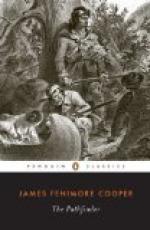It may strike the novice as an anachronism to place vessels on the Ontario in the middle of the eighteenth century; but in this particular facts will fully bear out all the license of the fiction. Although the precise vessels mentioned in these pages may never have existed on that water or anywhere else, others so nearly resembling them are known to have navigated that inland sea, even at a period much earlier than the one just mentioned, as to form a sufficient authority for their introduction into a work of fiction. It is a fact not generally remembered, however well known it may be, that there are isolated spots along the line of the great lakes that date as settlements as far back as many of the older American towns, and which were the seats of a species of civilization long before the greater portion of even the older States was rescued from the wilderness.
Ontario in our own times has been the scene of important naval evolutions. Fleets have manoeuvered on those waters, which, half a century ago, were as deserted as waters well can be; and the day is not distant when the whole of that vast range of lakes will become the seat of empire, and fraught with all the interests of human society. A passing glimpse, even though it be in a work of fiction, of what that vast region so lately was, may help to make up the sum of knowledge by which alone a just appreciation can be formed of the wonderful means by which Providence is clearing the way for the advancement of civilization across the whole American continent.
THE PATHFINDER.
CHAPTER I.
The turf shall be my fragrant shrine;
My temple, Lord! that arch of thine;
My censer’s breath the mountain airs,
And silent thoughts my only prayers.
Moore
The sublimity connected with vastness is familiar to every eye. The most abstruse, the most far-reaching, perhaps the most chastened of the poet’s thoughts, crowd on the imagination as he gazes into the depths of the illimitable void. The expanse of the ocean is seldom seen by the novice with indifference; and the mind, even in the obscurity of night, finds a parallel to that grandeur, which seems inseparable from images that the senses cannot compass. With feelings akin to this admiration and awe — the offspring of sublimity — were the different characters with which the action of this tale must open, gazing on the scene before them. Four persons in all, — two of each sex, — they had managed to ascend a pile of trees, that had been uptorn by a tempest, to catch a view of the objects that surrounded them. It is still the practice of the country to call these spots wind-rows. By letting in the light of heaven upon the dark and damp recesses of the wood, they form a sort of oases in the solemn obscurity of the virgin forests of America. The particular wind-row of which we are writing lay




